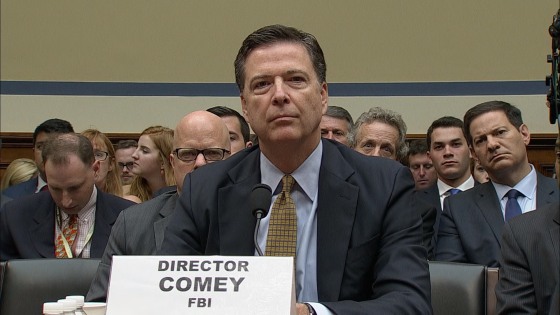FBI director James Comey stuck to his guns Thursday and defended his decision not to charge Hillary Clinton with a crime for her use of a private email server while serving as secretary of state.
Summoned to appear before the Republican-led House Oversight and Government Reform Committee, Comey insisted again that Clinton "did not break the law" and that there was not enough evidence to charge her with a crime.
"That's just the way it is," Comey said. "Folks can disagree about it."
But that answer did not go over well with the Republicans at a more than four-hour hearing that Rep. Gerry Connolly, a Virginia Democat, dismissed as "political theater."
Asked point blank by Rep. Jason Chaffetz, the Utah Republican who heads the committee, whether Clinton lied, Comey said, "We have no basis to believe she lied to the FBI."
"Did she lie under oath?" Chaffetz asked.
"Not to the FBI," Comey answered.
Rep. Trey Gowdy, the South Carolina Republican who chaired the House's Select Committee on Benghazi, asked if it was true — as Clinton has long maintained — that she did not email any classified information. Comey said it was not.
"There was classified information emailed," Comey said.
But only three of the 30,000 emails the FBI reviewed bore classified markings, and those were buried in the body of the text, Comey said.
Rep. John Duncan, R-TN, asked Comey if he had heard that "there is one standard of law for the Clintons and another for everybody else."
"It's not true, but I've heard it a lot," Comey replied.
Comey kept his cool through the hearing. But Rep. John Mica, a Florida Republican, appeared to get under the FBI chief's skin.
Mica asked Comey if he'd seen the hit musical "Hamilton" and then suggested his Tuesday announcement that Clinton would not be charged was "choreographed."
"Look me in the eye," Comey told Mica. "I did not coordinate that with anyone."
Before Comey testified, Chaffetz made it clear he was not happy that the Democratic presumptive presidential nominee had escaped prosecution.
"We're mystified and confused by the fact pattern you laid out and the conclusion you reached," he said. "Hillary Clinton created this mess."
But Rep. Elijah Cummings. a Maryland Democrat, defended Comey, telling him he had a "thankless task." He noted that just days ago the GOP was praising his "integrity."
"There's no recommendation you could have made that would not have been criticized," Cummings said. "I firmly believe that your decision was not based on convenience, but on conviction."
Cummings also slapped his Republican colleagues for continuing to use taxpayer money to investigate allegations "that have already been debunked."
"Honestly I would not be surprised if the Republicans set up a new committee to investigate why the FBI" did not charge Clinton, Cummings said.
"Republicans have turned on you with a vengeance," Rep. Carolyn Maloney, a New York Democrat, said to Comey later.
Maloney also asked whether it was true he was bribed to let Clinton escape, as she said GOP presidential candidate Donald Trump claimed.
"I know this is a ridiculous question," Maloney said.
"No," Comey replied.
Comey, a Republican, had an inkling of the furor to come after Chaffetz complained on MSNBC's "Morning Joe" that Clinton was being held to a different "standard."
"If your name is Clinton or you're part of the rich and powerful, you live under a different set of rules than everybody else," Chaffetz said. "Because it does appear, based on the fact pattern laid out by the director, that if you had done those things, you'd probably be in handcuffs."
What Clinton did, Chaffetz said, "put peoples' lives in jeopardy."
Comey on Tuesday wrapped up a year-long probe of Clinton by announcing that while she was careless when she used a personal email server during her tenure in the State Department, there was no evidence she committed a crime, and that he would recommend to the Justice Department that no charges be filed.
Attorney General Loretta Lynch on Wednesday announced that the presumptive Democratic presidential nominee would not be charged with any crimes.
In doing so, Lynch closed a chapter on a contentious case that Republicans called proof Clinton was not to be trusted, and which the Democrats decried as a partisan attempt to torpedo her chances of winning the White House.
House Speaker Paul Ryan, R-WI, was quick to disagree, saying Lynch's decision "defies explanation." He also recommended that Clinton be barred from the intelligence briefings that major-party presidential nominees usually receive, "given how recklessly she handled this during the presidential campaign."

